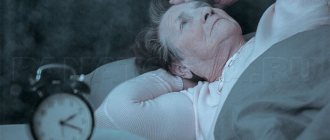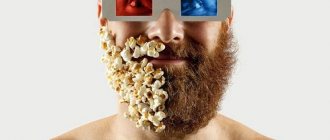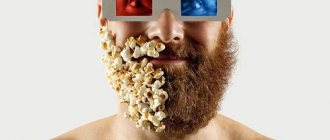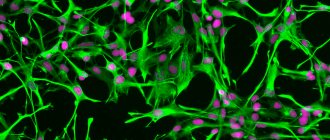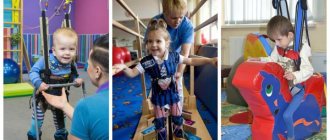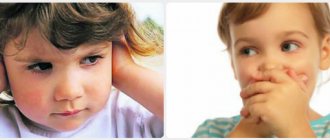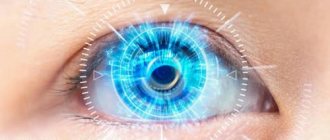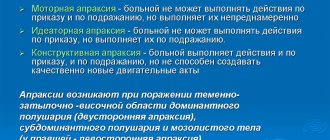Issues discussed in the material:
- What is senile dementia
- What types and degrees of disease exist?
- How to understand that the disease is progressing
- What treatments are there for dementia?
- How to care for an older person with dementia
Dementia of old age is a clinical syndrome characterized by loss of memory and other mental functions. It appears as a result of progressive chronic degenerative lesions of the brain. Dementia is expressed not only in disruption of thinking processes, but also in changes in behavior, up to personality degradation. The article examines the types of dementia, methods of treating it, as well as methods of caring for older people with this disease.
Why does senile dementia occur?
20 years is the age at which the natural process of loss of nerve cells begins. Therefore, a slight impairment of short-term memory is quite normal in all older people. A person begins to forget the names of recent acquaintances, places where he put things, etc. As a rule, problems in everyday life do not arise from this type of deviation. However, if dementia progresses in an elderly person, the distress will be much stronger.
The most common causes of pathology are:
- Alzheimer's disease (65% of all cases);
- impaired vascular function as a result of atherosclerosis, arterial hypertension, poor circulation and blood counts;
- alcohol and drugs;
- Parkinson's disease;
- Pick's disease;
- diabetes;
- head injuries;
- endocrine and autoimmune diseases;
- infectious diseases (AIDS, encephalitis, etc.);
- aggravated diseases of internal organs;
- severe renal and liver failure;
- consequences of the hemodialysis procedure.
Sometimes the progression of the disease in the elderly occurs due to several reasons at once (for example, in the classic senile (senile) mixed form of the disease).
Risk factors leading to the development of dementia:
- age 65 years and above;
- hypertonic disease;
- increased levels of lipids in the blood;
- obesity, as well as lack of physical activity.
- lack of mental activity for three years or more;
- low estrogen levels (only in older women).
We recommend
“Signs of senile dementia and ways to prolong mental health” Read more
Environmental
There are several reasons, we list them:
- Advanced age. After 60–65 years, the risk of the disease increases significantly, this is due to the fact that older people, due to their age, are more susceptible to external factors.
- Diabetes. This disease often affects blood vessels, including the brain, and in the absence of adequate treatment can lead to dementia.
- Stroke. When a stroke occurs, certain blood vessels are damaged and there is bleeding in the brain, which can contribute to the onset of dementia.
- High pressure. Hypertension also negatively affects the health of blood vessels and can lead to dementia.
- Any brain injuries, as well as tumors, hematomas, large abscesses.
- Smoking and alcohol have a huge negative impact on the brain. The result is senile dementia.
- Level of education and professional activity. Highly educated people who engage in mental work all their lives are less susceptible to senile dementia, and vice versa: people who do not have an education and do not train their brains get sick more often, and their disease progresses faster.\
- Violation of immunity and metabolism in the body.
Hereditary
If a blood relative of an older person has had Alzheimer's disease or other similar diseases, the likelihood of developing dementia increases.
Types of dementia in old age
According to the etiological factor, dementia can be:
- vascular,
- atrophic,
- mixed.
Depending on where the lesion is located, the following types of dementia in the elderly are distinguished:
- cortical (in the cortical centers of the brain);
- subcortical (basal ganglia, white matter, limbic system, etc.);
- cortical-subcortical;
- multifocal, accompanied by many foci of brain tissue damage.
Syndromic classification divides dementia into:
- total (changes are rough, pronounced);
- lacunar, or dysmnestic (occurs with milder symptoms).
Pseudodementia is distinguished separately. In this condition, cognitive functions sharply deteriorate due to existing psychiatric pathology (hysteroid psychopathy, depressive disorders).
Degrees of senile dementia
1. Early.
Since the disease progresses slowly, its symptoms are invisible to both the patient and relatives. Therefore, seeing a doctor is often late.
Clinic for early stage dementia in older people:
- forgetfulness;
- violation of the time count;
- disorientation in space, even in a familiar place.
2. Average.
Symptoms of the disease intensify:
- an elderly patient begins to forget what happened recently, in addition, he does not remember the names and faces of acquaintances;
- an elderly patient ceases to navigate even in his own home;
- communication becomes significantly more difficult;
- a person suffering from dementia is no longer able to take care of themselves without assistance;
- the elderly person's behavior worsens;
- for a long time the patient performs the same aimless actions or asks about the same thing several times.
3. Late.
The manifestation of dementia in old age at this stage is the onset of complete dependence of the patient on his relatives, who provide constant care for him. Main features:
- absolute disorientation in time and surrounding space;
- an elderly patient has difficulty recognizing relatives and friends;
- a person suffering from dementia needs constant care, as he cannot eat food on his own, as well as perform simple hygienic manipulations;
- behavioral disturbances intensify, the elderly patient becomes more and more aggressive.
We recommend
“Dementia in older people: symptoms and treatment” Read more
Get a good night's sleep
If you don't sleep well, your attention wanders and your concentration decreases. And consolidation and improvement of memory occurs in the deep stages of sleep. Useful tips:
- Don't eat late at night.
- Go to bed and get up at the same time.
- Avoid drinking alcohol and coffee before bed.
- Don't sleep in a smoky room.
Alzheimer's disease
Alzheimer's disease is characterized by a selective or lacunar type of dementia. This is an atrophic senile type of dementia, the symptoms of which appear before the age of 60. The majority of cases are observed between the ages of 65 and 75 years. Alzheimer's disease can be inherited. Risks are reduced if you study music and foreign languages from early childhood.
This type of senile dementia can develop for the following reasons:
- getting injured;
- state of oxygen starvation of the brain;
- neurotoxin poisoning.
The disease develops as a result of a biochemical disorder of glucose metabolism, which leads to the formation of plaques consisting of poorly soluble protein. These plaques, deposited in the brain, contribute to degenerative changes in nerve cells. As a result, lesions form in the cerebral cortex, which can lead to total dementia.
How quickly does dementia progress in old age? At the onset of Alzheimer's disease, memory is impaired. The elderly man is slightly absent-minded and a little forgetful, which does not attract attention at first.
The environment begins to notice changes when a person constantly forgets even recently occurring events. Although the elderly patient remembers much earlier episodes from her life very well. But later they disappear too. A patient with Alzheimer's syndrome cannot recall necessary information at the right time.
The newly received information is practically not absorbed. Elderly people have impaired spatial and temporal orientation. They often start asking questions about what day of the week, date, month, year it is. The course of the disease worsens, and the person ceases to understand where he is and does not recognize himself in the mirror. In addition, visual and hearing disturbances appear, and tactile sensitivity is impaired. Older patients cease to correctly perceive acquaintances, relatives, and home environment. In the later stages of dementia, older people cannot adequately identify their own identity.
The practical sphere of activity is gradually degrading. The process begins with the loss of complex professional skills and ends with the complete disappearance of self-service skills.
At the very beginning of the development of the disease, the elderly person is animated and fussy. Then his fussiness turns into reflexive monotonous movements. Speech is gradually reduced.
Emotionally, an Alzheimer's patient develops egocentrism, dissatisfaction with himself and his inability to overcome difficulties in professional activities and studies.
First, the elderly patient realizes that abnormal abnormalities are occurring and tries to take action. As the disease progresses, the level of self-criticism decreases. At the same time, the circle of interests of an older person narrows significantly, his judgments become more primitive. Literally before our eyes, the elderly patient degrades emotionally, turning into a very distrustful, touchy and, finally, indifferent person.
We recommend
“Products for Alzheimer’s patients: dishes, clothing, gadgets, games” Read more
Mastering foreign languages using mnemonics
The most serious difficulty in mastering a foreign language is building up your vocabulary. To capture the sound and meaning of a word in your memory, and be able to use it at the right moment in a conversation, use the following memorization plan:
- Create an image based on the word.
- Connect the image with the meaning of the word using association.
- At the right moment, remove the image from your memory and remember the sound of the word.
We'll show you how to learn German words using mnemonics. Here's what it looks like: das Haus means "house" in German. The sound of this word resembles the sound of the Russian word “chaos”, its meaning is fantastic disorder.
Imagine that some house is a fantastic mess. At the right moment, remember this image - and the right word will appear in your head, and you will also know how to pronounce it. You should come up with such sentences or stories yourself. Your authorship will contribute to the development of memory and attention.
People who teach mnemonics believe that with its help it is possible to learn a hundred words in an hour. And people who have attended mnemonics classes also claim that this technique actually works.
Vascular dementia
Of all types of senile dementia, 20% of cases are due to dementia of vascular origin. This species ranks second after Alzheimer's disease.
Dementia stands apart against the background of vascular accidents:
- hemorrhagic stroke, in which brain vessels rupture;
- ischemic stroke, during which blockage of blood vessels occurs and blood circulation in a specific area worsens or stops.
In these situations, brain cells die en masse, with focal symptoms most clearly manifested, which depend on the location of the affected areas. The clinical pictures of dementia after stroke are varied. It is important how severely the vessels are affected, what is the area of the blood supply to the areas of the brain. Much will depend on the compensatory capabilities of each individual organism. In case of vascular injury, timely and adequate medical care is of great importance.
Dementia of old age, resulting from chronic circulatory deficiency, occurs in a more homogeneous clinical picture.
We recommend
“Vascular dementia: symptoms, diagnosis and treatment methods” Read more
Take vitamins for memory
In older people, the rate of absorption of nutrients decreases. This makes it difficult to get the B12 your body and mind need. The deficiency problem is solved with injections. Vitamin D comes from outside and is synthesized under the influence of sunlight. It is involved in information processing and helps to remember. Needed by blood vessels of the brain and bone tissue.
Senile dementia with Lewy bodies
This type refers to atrophic, degenerative processes, during which intracellular inclusions (Lewy bodies) are formed in the brain. What are the causes of this phenomenon and what are the mechanisms of its development, specialists do not know. Doctors note the important role of hereditary factors in the progression of pathology. This type of elderly dementia accounts for 15–20% of the total mass of senile disorders of the central nervous system.
Many symptoms of this type of pathology are similar to the manifestations of dementia described above. The most characteristic indicator is fluctuation, which consists of sudden disruptions in intellectual and mental activity. Doctors consider these deviations to be partially reversible.
With small forms of fluctuations, elderly patients experience a temporary inability to concentrate on anything specific (subject, object, task, as well as the process of solving it). If an elderly patient has large forms of fluctuation, he does not recognize objects, close people, and is not able to navigate the area.
Another distinctive characteristic of this type of dementia is auditory, visual, and sometimes taste and tactile hallucinations.
In addition, autonomic disorders are observed during the disease process:
- hypotension of the orthostatic type, in which an elderly patient’s blood pressure sharply decreases when changing body position;
- fainting, arrhythmia;
- disorders in the gastrointestinal tract, increased constipation, urination problems, etc.
Treatment of senile dementia with Lewy bodies is similar to that of Alzheimer's disease. If there are signs of confusion in an elderly patient, acetylcholinesterase inhibitors and sometimes atypical antipsychotics are prescribed.
Alcoholic dementia
This type appears due to the long-term (over 15–20 years) influence of toxic substances on the brain. In addition to the direct effects of alcohol, the development of pathology is indirectly affected by vascular disorders and endotoxins in alcoholic liver damage.
In most patients at the third stage of alcoholism, when the personality has degraded, atrophic changes in the brain are noticeable, in the form of dilated cerebral ventricles and furrows in the cerebral cortex.
Clinical symptoms of alcoholic dementia are expressed in a diffuse decrease in intelligence. Due to personality degradation, the patient’s memory, attention, and ability to think abstractly deteriorate. Emotional hardening occurs, social ties are destroyed, thinking becomes primitive, and all value guidelines disappear.
At this advanced stage of alcoholism, it is difficult to motivate a person to engage in treatment. But if the patient completely abstains from alcohol for 6–12 months, then the symptoms gradually decrease. In addition, according to research, organic defects are smoothed out.
Consequences of senile dementia
The development of dementia in old age leads to the following:
- Loss of self-care skills.
- Threat of emergency situations (fire, gas leak, flooding, etc.).
- Risk of injury to the patient.
- The likelihood of bedsores forming, as well as their infection (if the patient is immobilized).
- Exhaustion and dehydration of the body.
- Aggressive behavior towards other people, self-aggression.
- Mental disorders, manifested in the form of delusions, hallucinosis, etc.
We recommend
“Caring for older people with dementia: learning to build relationships” Read more
How is senile dementia diagnosed?
The diagnosis is made in the presence of symptoms of dementia, expressed in deterioration of memory and cognitive functions, loss of control over one’s impulses and emotions. The disease is also confirmed by the results of EEG, CT and neurological examination.
The condition for correct diagnosis is clarity of consciousness, absence of confusion, confusion and delirium. If social maladjustment of an elderly person is observed for six months, his attention, thinking, and memory are impaired, then a diagnosis is made based on the ICD-10 criterion.
The diagnostic process takes into account intellectual-mnestic disorders, loss of skills and abilities that manifest themselves directly in everyday life and at work.
Depending on the general clinical picture, several types of dementia are distinguished:
- dysmnestic (partial dementia);
- diffuse (total dementia);
- lacunar (partial changes).
Depending on the nature of its course, dementia can be pseudo-organic, organic, post-apolexic, post-traumatic, etc.
Dementia can manifest itself in Pick's disease, Alzheimer's disease, cerebrovascular pathology, exogenous and endogenous intoxication of a chronic type. It can also be a complication due to a cerebrovascular disease, general intoxication, or degenerative or traumatic brain damage.
Treatment of dementia in old age
The treatment regimen for senile dementia is influenced by comorbidities. It is no secret that old people have many pathologies.
Drug correction is aimed primarily at the etiopathogenesis and mechanisms of disease development. It is especially important to pay attention to cognitive problems during therapy. If additional research confirms the diagnosis of Alzheimer's, the prescription of centralized cholinesterase neurotransmitter inhibitors is justified. The patient is also advised to take “Amiridin” (from 10 to 40 mg 1 time per day), “Tacrine” (4 times a day, 10 mg), “Exelon” (1.5 mg, if in solution - 0.75 ml) and a course of Donepezil (for 6 weeks, 5-10 mg per day).
According to some data, the use of medications will help slow down the development of the disease and prevent dementia in old age:
- estrogenic hormones;
- non-steroidal anti-inflammatory blockers of COX 1 and 2;
- vitamin E;
- “Selegilina” (10 mg per day, preferably taken before lunch and divide the dose into two doses);
- “Cognitive” (10 mg in the morning);
- "Yumexa" (in two doses of 10 mg).
In elderly dementia of vascular origin, medications that have a positive effect on areas of possible risk are important. This:
- antihypertensive drugs (Berlipril, Lisinopril, Vazar);
- disaggregants (“Magnikor”, “Cardisave”);
- anticoagulants "Clopidogrel", "Tugina" (according to indications).
If the disease is accompanied by anxiety and insomnia, antipsychotics and benzodiazepines (Haloperidol, Chlorprothixene) are prescribed in small doses. For depressive conditions, an elderly patient is prescribed antidepressants.
In some cases, in order to improve cognitive-behavioral abilities, regular exercise is practiced to train memory processes and attentiveness. However, straining your memory is useful only when cognitive impairment is not too severe.
It is important that the elderly patient is supported by family and loved ones. Due to impaired perception, anxiety and confusion in older dementia patients manifests itself in unusual conditions. Therefore, you should avoid trips and trips - they can lead to severe disorientation. The home environment, on the contrary, has a beneficial effect on an elderly person.
At the very beginning of the disease, when men and women are still able to work, they should not overwork. You need to try to maintain a work routine and fully relax. Elderly patients should be monitored as there is a risk that they will confuse medications or dosages.
Nutrition is especially important in senile dementia. An elderly patient should eat well, eat a lot of nuts, fresh foods containing vitamins and fatty acids. The patient, even the elderly, needs light loads. Normotimics (lithium salts) and nootropics (“Gamalon”, no more than 900 mg; “Lucidril”, no more than 900 mg; “Piroditol”, “Nootropil”) have a good effect on the body.
We recommend
“Treatment of dementia in older people: drugs for different stages of the disease” Read more
Top 10 drugs for the brain and memory of older people
There are quite a lot of medications prescribed for older people to improve brain activity. The table lists the most common ones and also highlights their advantages and disadvantages.
| A drug | Description | pros | Minuses |
| Noopept | Noopept is a new generation nootropic drug, developed by domestic scientists. Helps improve blood circulation and brain function, restore memory and attention, reduce dizziness, improve well-being and normalize sleep. The composition of the drug has a unique complex effect: 1. Nootropic properties restore memory. Unlike similar drugs, Noopept directly affects all three stages of memory: I - memorization, II - storage, III - reproduction. 2. The antioxidant properties of Noopept build protection against the effects of free radicals. 3. The neuroprotective properties of the drug protect the brain cells of an elderly person and activate the cells’ own defense mechanisms. Under the influence of the active substance of the drug, the brain becomes more resistant to various damaging influences, and the degree of damage to neurons decreases. 4. The nootropic provides additional nutrition and blood supply to the brain, improves the rheological properties of the blood. | An innovative drug that demonstrates high efficiency. Promotes restoration of cognitive functions (improves attention, memory, learning ability). It also normalizes sleep and improves mood. The medicine has a minimal number of contraindications and side effects and is not addictive in older people. | Recommended course of treatment: 1.5–3 months. |
| Vinpocetine (Cavinton) | A medicine that corrects cerebral circulatory disorders. | Improves metabolism and cerebral blood flow, utilizes glucose. | Taking the medication often leads to a decrease in blood pressure, causing tachycardia and extrasystole. |
| Phenibut | A nootropic that has an anxiolytic, anticonvulsant, and antioxidant effect. | Reduces anxiety levels, improves sleep, helps with headaches. | Outdated drug. There are a number of side effects and contraindications. |
| Piracetam | Nootropic medicine. | Helps older people restore and stabilize brain function and has an anticonvulsant effect. | One of the very first nootropic drugs, considered obsolete. It has quite a large number of side effects and contraindications. The drug cannot be combined in therapy with Thyroxine, Triiodothyronine. |
| Glycine | Aminoacetic acid. Used as a nootropic medicine. | Mild action drug. Removes minor anxiety, helps normalize metabolism, stimulates brain function. | It has a rather weak accumulative effect. |
| Fenotropil | Nootropic drug. | The medicine has a vegetative stabilizing, psychostimulating, antidepressant, antiasthenic, anticonvulsant effect, and improves performance. | It has a large number of side effects and contraindications. Strengthens central nervous system stimulants, antidepressants, and other nootropic drugs. |
| Aminalon | Nootropic that stimulates metabolism in the central nervous system. | Has moderate psychostimulating and anticonvulsant effects. | It has side effects, contraindications, enhances the effect of benzodiazepines and sleeping pills. |
| Pantogam | Nootropic medicine. | Activates anabolic processes in neurons and has an anticonvulsant effect. | Provides prolongation of the action of barbiturates, multiplies the effects of local anesthetics, anticonvulsants, and has many side effects. |
| Picamilon | Nootropic drug that corrects cerebral circulatory disorders. | It has an antioxidant, psychostimulating and tranquilizing effect. | Contraindicated for kidney disease, there are many side effects. |
| Cinnarizine | Corrects cerebral circulation disorders, blocks calcium channels. | Improves cerebral circulation and peripheral circulation. The drug is available due to its low cost. | An outdated drug with many side effects. |
The table data shows that Noopept is one of the most effective and safe nootropics today. The medicine improves cognitive functions (attention, memory), reduces the level of anxiety, irritability, and has vegetotropic and antiasthenic properties. The effect becomes noticeable, as a rule, after 2 weeks of taking the medicine; no side effects are noted.
To purchase such a medicine for brain function and memory for older people, a prescription is not required; it does not cause addiction or withdrawal symptoms. Patients of retirement age tolerate the drug well; it demonstrates effectiveness both in monotherapy and in complex treatment. In older people, sleep improves, anxiety levels decrease, memory and ability to concentrate improve. The medicine does not cause drowsiness, and it does not have a harsh stimulating effect.
We recommend
“A set of exercises for older people: body and breathing” Read more
Non-drug treatment
In addition to medications, a patient with senile dementia may benefit from:
- Cognitive trainings that involve reading books together, reproducing them, and discussing them. Elderly patients memorize poems and study using special cards. It is important to practice daily, as there is a chance that everything you learn will be quickly forgotten.
- Biographical trainings, the purpose of which is to maintain memories that are erased from memory. During these classes, events that happened in the past are discussed, old photographs are viewed, and retro music is listened to.
- Keeping a diary in which events are recorded. It helps train thinking, helps relieve excessive emotional tension and eliminate negative experiences.
- Physical activity, including sets of exercises, as well as walks in the fresh air.
- Art therapy, music therapy, pet therapy aimed at solving educational, developmental and therapeutic problems.
Morning exercises
A special set of exercises for morning exercises will help improve blood circulation, which will have a positive effect on the quality of memory. You need to do it every day, without missing a single day. It perfectly complements classical exercises, and you should do gymnastics first while lying in bed. First you need to rub your palms against each other to warm up and activate the body.
Some interesting exercises:
- Slowly bring your hands to your face and lightly rub under your eyes with your thumb knuckles.
- Extend your palm with your thumb extended. Stroke the front of the neck with rubbing movements.
- Grasp the lower part of the chin with your thumbs and rub your cheeks with your palms.
Similar rubbing actions should be repeated for all parts of the head, shoulders and arms. You can use not only your palms, but also your fingertips.
Modern methods of treating dementia
In the 21st century, new developments in the field of recognition and treatment of dementia in old age are constantly emerging. For example, modern diagnostic methods include cerebrospinal fluid analysis, MRI and positron emission tomography.
Some laboratories are working on a vaccine for dementia. Scientists “train” the immune system to identify pathogenic proteins and eliminate them.
Another promising area is gene therapy. It will help prevent the deposition of affected proteins in the brain.
We recommend
“Anti-dementia drugs for the elderly depending on the stage of the disease” Read more
How to care for someone with dementia
Elderly patients with dementia require constant care. Patients themselves, as well as those caring for them, experience great emotional and physical stress. An elderly patient is unpredictable; at any moment he can commit an inappropriate act and endanger not only himself, but also those around him. Therefore, such persons often suffer from discrimination against them. This happens especially often in nursing homes, where elderly patients are cared for by strangers who do not fully understand the essence of the disease. There are known cases of rude treatment of elderly patients and their relatives by medical personnel. If society becomes more aware of what dementia is, the situation could improve significantly.
Dementia in old age is not a death sentence. All that is required from relatives is an understanding that their loved one needs care and help in everyday life. Family members can make the environment safe by being considerate. Patience is important in providing complete care.
Regular examination of an elderly patient by a doctor and monitoring of medication intake is necessary. Medicines should not be in the public domain.
Unfortunately, the prognosis for elderly patients is quite disappointing. The process of mental degradation is irreversible, it cannot be stopped, but it is quite possible to slow it down so that the patient can lead a full life in society longer.
Life expectancy with this disease can vary from several months to decades. Timely therapy and regular training aimed at improving memory and attention are especially important. It would be reasonable to place the elderly patient in a special geriatric center for ongoing medical monitoring.
The following are used as preventive measures:
- control of blood pressure, cholesterol and sugar levels (after 60 years);
- rejection of bad habits;
- constant physical activity;
- regular mental training;
- proper nutrition.
To avoid dementia in old age, it is necessary to constantly train the brain, develop memory and attention. To do this, you should read books and retell them to others, count and add up prices in the store in your mind, and solve crosswords. Sometimes preventing a disease is much easier than dealing with its consequences.
We recommend
“Boarding house for elderly people with dementia: how to make the right choice” Read more
Exercises
The best way to strengthen your memory is to approach the issue comprehensively. After creating all the conditions to improve it, you need to use special exercises. The following exercises will help preserve your memory in old age:
- Try to remember people in a store or on a bus. The task is to remember their faces and clothes after an hour, describing their appearance in as much detail as possible.
- Count backwards. It is recommended to start with 300, gradually counting to 1.
- Write down 20 words on a piece of paper. Try to remember them in 30 seconds. Turn away and write them all on a blank piece of paper.
There are other exercises that help improve memory quality. You can even come up with them yourself, based on famous puzzles.
There is a special mnemonics. It involves creating analogies, which helps to remember important information and strengthen memory. You can: shorten phrases to the first letters, figuratively visualize thoughts, come up with rhymes, break information into parts.

